In a further attempt to prove I'm not out to deceive you guys yet again for
my own sick amusement, we're back with another visit to the Third Row (...much
later than I had previously promised. Sorry. We're still working all the bugs
out of the system, as it were...and by that, I mean the guy in this row is
working on getting his arse back into a regular pattern for your
misery/enjoyment.)
Also, so that I can't be seen as going back on my word, and thus holding
myself open to false advertising charges, we bring you the third of four
installments from this February's theme of Blaxploitation History Month.
The good news (or bad, depending how you feel about it) is that, as of last
week, we've spent all the time there is to spend cinematically at Falconhurst.
I'll give anyone masochistic enough to pine for more adventures of the Maxwell
clan and the slaves they...somehow I don't think 'love' is the right word
here...a chance to say their goodbyes.
...OK, that's long enough.
For those who are still longing for a cinematically altered blast from the
past, worry not. We're still going back to another time this week, albeit of a
different sort than the last two pre-Civil War shenanigans.
That's right, this week, we travel back in time slightly less far...as we
review Fred Williamson's 1975 adventure into the old west, Boss Nigger.
(Yeah...they really couldn't get away with a title like that now. When I
first learned about this film, I did a doubletake on hearing its title. On
seeing the trailer, I knew I had to watch this and review it.)
Now, on starting this film, it looks like it could theoretically be any
western...at least, as far as the first characters we see go. Right off the bat,
we're introduced to a group of stereotypical western bandits whose behavior
tells you two things immediately:
1) These guys aren't gonna be worth much to the plot
and
2) They probably won't be around for long.
Point two is confirmed with a vengeance fairly quickly as the group are
ambushed and shot by a pair of gunmen...largely without a fight...barring one
fellow who at least gets the dignity of dying with a few last words
...I only said the movie gave him the dignity for it...I never said he used
it properly.
Anyway, in the aftermath, the identities of these mysterious gunslingers are
revealed to be the heroes of our movie, the bounty hunter Boss Nigger and his
partner/sidekick Amos (played by Fred Williamson and D'Urville Martin
respectively.)
Now, before we continue, I'd like to take a moment to say something for this
opening. To anyone who doesn't know what to expect from this movie (and with a
title and pitch like this, you've only got yourself to blame) this opening
actually pulls a pretty good fast one. The way Boss and Amos are first
introduced, you get no indication of either of them as far as race. All shots
are from the shoulders down, and they're wearing gloves. It's only when Amos
starts talking after all the shooting dies down that we finally see the two and
the reveal is made.
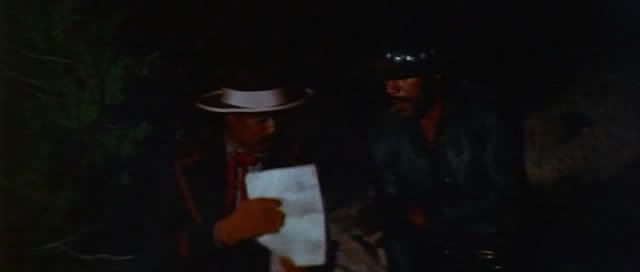
Boss and Amos have found the next few pages for the script
in this guy's jacket.
Film's back on, guys!
Again, doesn't work too well unless you have no idea what the movie's about,
but still kind of a nice touch.
Anyway...while searching the bodies and checking IDs for wanted bounties,
they stumble across an interesting find: one of the bandits has a note on them
talking about one Jed Clayton, a bounty they've been after, and his holing up in
a small town nearby. As is often the case when these things are introduced at
the start of a film, the two decide this town is their next stop.
What follows is an opening that does one thing blaxploitation films often
excel at...providing the hero with a theme song that can be best summed up in
the word 'badass.' This is one of those songs which can get stuck in your
head... ... ...and then leave you hoping you don't inadvertently start singing
it in public places if you value NOT getting your ass kicked in so hard your
teeth go flying.
In fact, here's the opening credits sequence for your enjoyment. Cause every
good earworm knows how to spread itself
After that 70s-vintage "They'll Never Play This On The Radio Again" moment of
catchiness, we resume the movie. Boss and Amos's trip is largely pretty
uneventful (mostly covered via the opening montage. Hey, not gonna complain,
while these two are pretty entertaining so far, just riding through the desert
can only entertain for just so long.) It's as they close in on city limits that
things rev up again and we're introduced to the third member of their travelling
group. En route to town, Boss and Amos come across a black family being ambushed
by another group of Clayton's archetypical goons (I will give them this much.
These guys can kind of aim at least...in so far as they actually kill
someone...of course, as far as the stormtrooper syndrome rule goes, sadly, the
dead man wasn't exactly considered crucial enough to the lot to be immune to
their firing wildly.) Boss and Amos intervene and drive them off...well...more
to the point, they mainly kill them...but hey...they're in a blaxploitation
western as minions to the film's main villain. In both of those genres, that
marks them for death right away anyway. Venn-Diagram the two and the fact Boss
and Amos have to shoot them speaks highly for their survivability. In the
aftermath, of this, the two are introduced to the lone survivor of the ambush,
Clara Mae (played by Carmen Hayworth.)
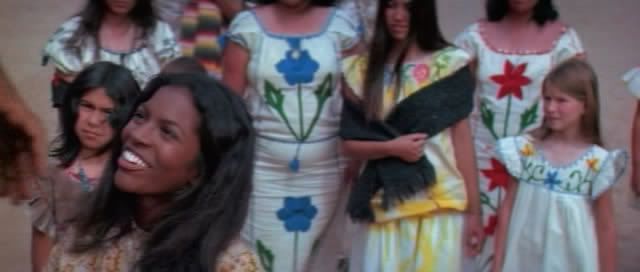
Clara Mae
(...capped from later in the film, I promise. She is NOT this happy when her
parents get whacked!)
She points them in the direction of town and even goes in with them. What
follows is an interesting variation on the classic 'stranger rides into town.'
To this town's credit, they handle it better than, say, Rock Ridge in the movie
Blazing Saddles. ...by the same token, I'm a bit surprised with how well they
handle it. I mean, we're talking about an old west town here...two black guys
come riding in with a dead white guy in tow behind them. Traditionally, this
would be a Gary Larson-esque 'Trouble Brewing' moment. In this film, however, it
largely just merits a lot of rather neutral stares (although this scene does
introduce probably one of the better townsfolk in the film, but we'll come back
to him.)
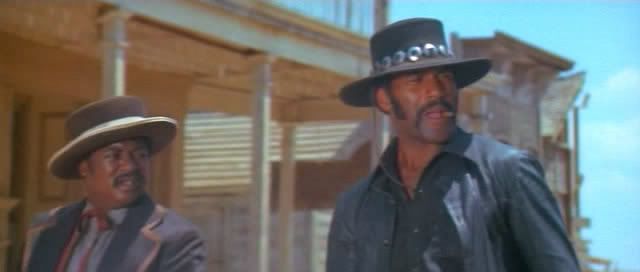
Our heroes arrive to a tumult of...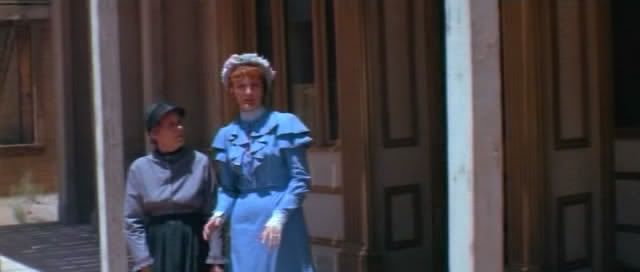
...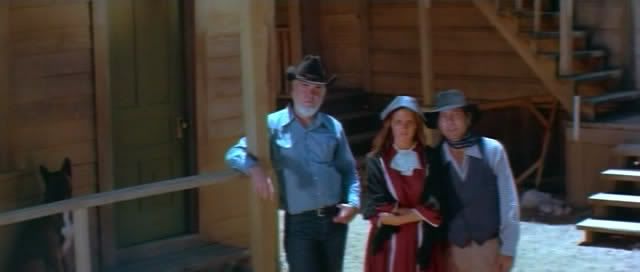
...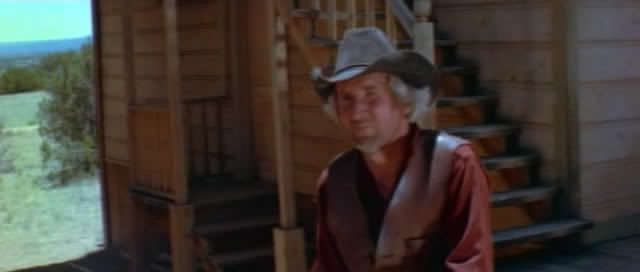
...pretty blank stares all around, really.
Anyway, after the walk o' blank stares, we get introduced to another great
western subversion, as well as a great moment for D'Urville Martin to shine in
his role as the sidekick and comedic relief. Let's put it this way...
When confronted with the classic 'local woman harassed by thugs' in this genre
do you
a) Give them a stern talking-to
b) Lay them out in one punch each, after which you yell at them about treating
women with respect
or
c) Draw a gun on them, make them apologize to the woman, then order them to take
off down the street, holding hands and skipping?
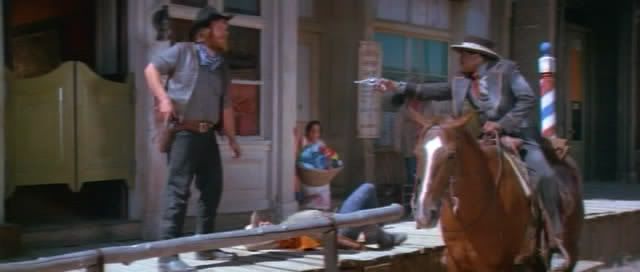
Diplomacy.
There's the right way, the wrong way, and the Amos way.
Which technically is neither right or wrong...but it's damn fun.
In case it's not obvious from the description (and the fact it's just that
much more amusing an option) this movie has Amos pick choice C. This is where I
have to take a moment to comment D'Urvile Martin, as he plays the scene (as well
as subsequent humorous bits) with just the right amount of smug to make the
character likable, rather than annoying (cause let's be honest, playing that
kind of confident...a little goes a long way.)
Anyway, Boss and Amos, learning the town has no sheriff, decide that, until
Jed is flushed out, the right thing to do would be to take up the office.
They're certainly qualified, but this winds up frankly shaking up the town's
mayor (played by R.G. Armstrong) who fears the repercussions the town will be
subject to if Jed finds out law and order has been reinstated where he has once
been allowed to run free. Fortunately for Boss and Amos, the mayor himself is
largely pretty powerless anyway, and instead simply hopes when Jed and his boys
deal with the new sheriff, he can wash his hands of the matter and save his own
hide.
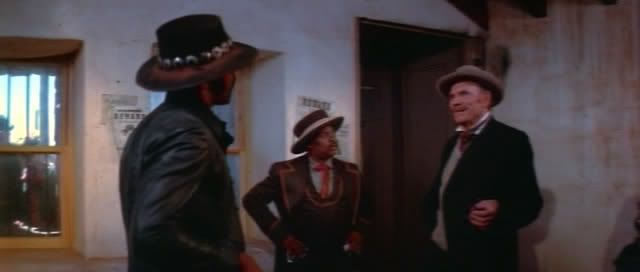
Welcome to town, boys.
In your new role as law enforcement, we're pleased to present you your own
corrupt, self-serving government weasel to hinder your progress.
Be careful with it, you only get one.
Suffice it to say, with this minimal opposition, Boss and Amos quickly take
to their new jobs, establishing a state that the movie's taglines sum up best
as: "white man's town...black man's law!" The results of which, actually, really
help the town (OK...a couple of them are really, just Boss and Amos messing with
the townsfolk (such as Amos explaining the act of calling the new sheriff a
nigger is punishable by a fine of $20 or two days in jail) but really, it helps
establish the fact they're approaching the job with just enough seriousness that
they don't plan to let the townspeople give them grief over their race... ...and
if they can do a little good-natured fundraising in the process, why not?)
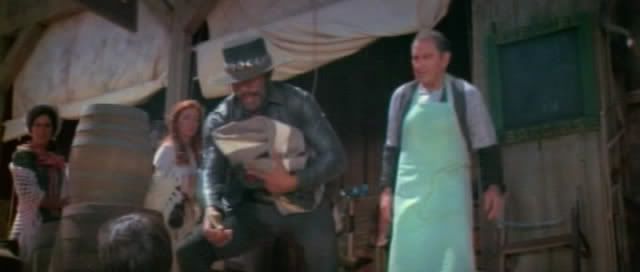
It really is a traditional system of order, really.
The Good Boss giveth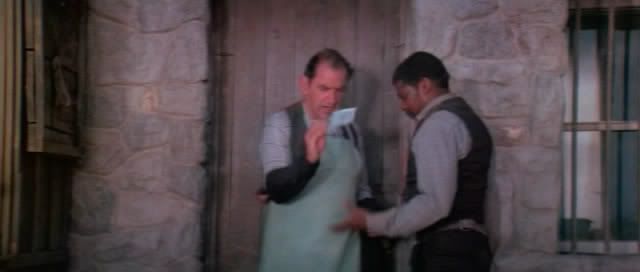
and the Good Boss taketh away
(...OK, so it's Amos doing it here, but it's all the same system.)
Of course, to their credit, not all the townspeople have it in for him.
Despite the rather passive-aggressive duplicity of the mayor and the largely
interchangeable nature of most of the residents, Boss and Amos still find a few
allies along the way. These ranging anywhere from the well-meaning, if somewhat
misinformed Miss Pruitt (played by Barbara Lee), to the local physician (Don
Barry), who shares the mayor's fear of repercussions, but still has enough guts
to do the right thing in a pinch, and the local blacksmith (played by Ben
Zeller) who comes to Boss's aid a few times in the movie... ... ...and
curiously, never says a single word. At all.
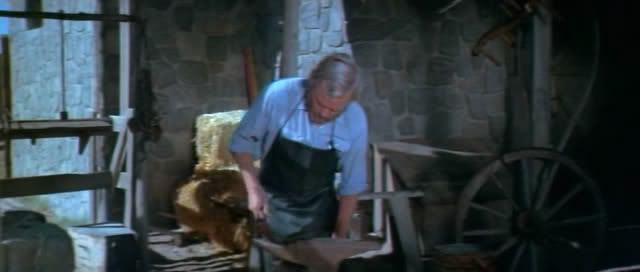
Despite that, he's still probably the coolest of the townsfolk.
These people, as well as the nearby local Mexicans all, to some degree or
other, learn to welcome Boss's application of a spurred boot to the proverbial
ass of evil in their town. Of course, as with any western, this charming
'getting to know you' period of shaking down minor goons eventually comes to an
end when Jed and his boys decide to turn up the heat.
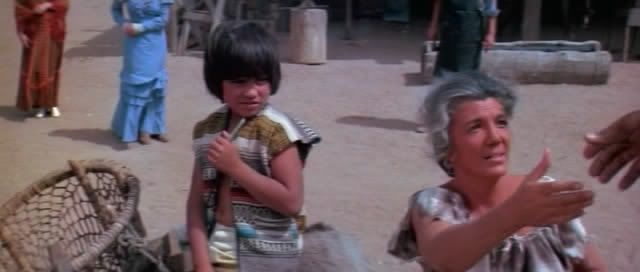
Actually, the Mexicans get along great with him.
Part of why their part of town looks like a much nicer area to hang out in...
even with the poverty and Clayton's boys' shenanigans.
I could take you through the rest blow for blow...but I'm gonna have to back
off since, among other reasons
1) It's a habit I'm trying to break myself of. It makes these reviews overly
long
2) It spoils things for ya...now, in some cases, I realize that's no loss, but
in a case like this, we come to point 3
3) This film's actually pretty good...and I'd rather not take away all reasons
for seeing it...granted, in a perfect world, even a blow-for-blow would leave
you wanting to see it, but I don't want to take the fun from ya.
Anyway, as I'd stated just now, overall, this film was a pleasant surprise.
After I came down from the initial reaction that can be best summed up as: "Holy
shit...they seriously made this?" and gave the film a watch, I was treated to a
film that was actually a pretty entertaining ride.
In evaluating it, one of the first things to keep in mind: this film actually
marks the writing debut for Williamson. To his credit, it's a pretty good debut
piece. A bit rocky at points (while much of the humor is pretty sharp, there's
still one or two lines that are likely to induce a few groans...most infamously,
one 'gem' from Miss Pruitt with regards to Boss and Clara Mae) but largely a
pretty solid effort. Probably one of the nicest touches about this is realizing
that a lot of this film is, in a way, Williamson riffing on his own work to this
point (really, the film is as much a parody of the classic 'badass vigilante who
cleans up a crooked town' element of blaxploitation as it is the classic 'man
with no name' tales of the western genre.) Looking at it again, gotta say...the
two genres actually work quite well together (...once you get used to some of
the minor anachronisms like the earlier mentioned arrival into town.)
About the only other complaint I have with the script really lies in the
ending (...as I now figure out how to best explain without blowing anything.)
Now, much of the ending's pretty enjoyable, don't get me wrong. Things build to
a great showdown between Boss and Clayton's gang. The problem is, the movie also
brings in a twist near the end that feels like it was meant to build up to
something more than it does within the context of the film. It's set up, and the
dramatic twist is put into place, but it largely seems to go unacknowledged by
those who should be effected by it the most. Though it is indeed cited in the
ever classic "This is for..." final confrontation, it otherwise seems to be
forgotten. In the end, it is brought back, but feels rather subdued after
everything that's happened. I realize this may be because such response would
likely seem out of place for a stoic hero like Boss, but all the same, it almost
feels like the element was either forgotten, or pared down during editing.
(...and I'm trying my damnedest not to blow what it is, which is why I'm
refraining from being cheeky about this kind of dangling plot thread.)
Anyway...from there, the acting is mostly pretty good. Williamson again
proves why he's a bankable lead, this time poking fun at his own sort of
archetype, and giving us a great character in the process. D'Urville Martin,
likewise, turns in a great job as Amos, being the one person in this kind of
parody who seems to be in on the joke, and is living it up. Carmen Hayworth
shows a decent range as Carla Mae (which, given the general roles for women in
westerns, is still worth something. To this end, there's actually a great bit of
back and forth humor in one scene involving her and Martin attempting to
discreetly knock out a guard.)
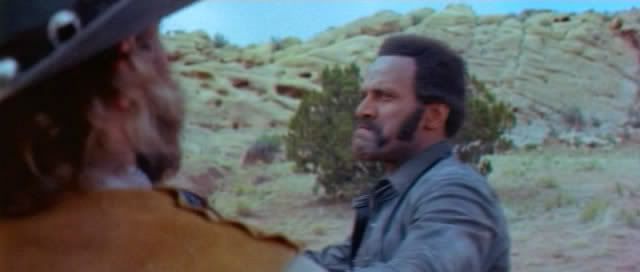
One of the things gotta love about Williamson.
He can make fun of himself, and still be badass about it.
The rest of the cast kind of run from doing pretty well to the classic
henchmen who tend to fluctuate between functional and ridiculous...but then,
that's kind of the idea behind how they work anyways. Most of the townsfolk
really tend to be either overly panicky or stoic folk (which, again, kind of
works for the genre.) Of these three, the only ones worth noting for anything
would be William Smith as Clayton, who manages to be the classic big bad without
falling quite into the same 'Yosemite Sam' style pit as most of his army of
expendables, Leigh's turn as Miss Pruitt which is mostly pretty good (about the
only thing I can hold against her is one particular monologue in the
film...you'll know it when you hear it...during the scene, she gains all the
emotion and passion of an old elementary school educational film strip
recording,) and finally R.G. Armstrong as the town's cowardly and self-serving
mayor, who manages to almost seem pitiable at points...at least until you
realize how far he's willing to go to protect his own hide, and suddenly he's
the perfect scumbag.
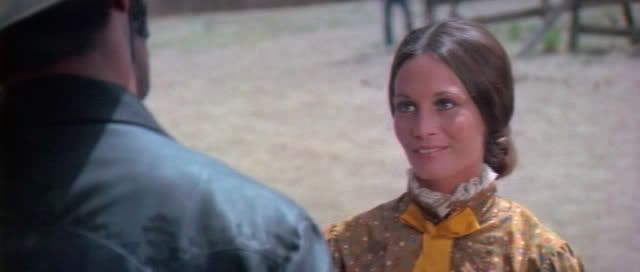
Miss Pruitt during aforementioned monologue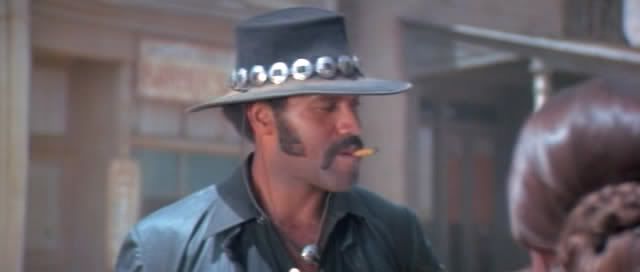
...I know Boss, it's hard enough just hearing it in the audience...
I can only imagine dealing with it in person.
With a fairly solid cast and a nicely done first-time script, director Jack
Arnold has some good materials on his hands for this. While I'm not sure if I
can say the film he gives us with them is anything award-winning, I do have to
admit...it's actually a pretty damn fun film. Despite the general 'ruthless
bastard' tact I've employed on some films to this point in these articles, I can
honestly say with a straight face this time, this could be worth your time as a
legitimately good film (as opposed to that 'horrible accident happens to a
clown' style of so bad it's funny of many of our previous offerings.) I won't
say it'll change your life, touch your soul, or any such stuff the professionals
get hefty checks to say (...if I'm supposed to be getting paid for these, I'm
missing the memo...as well as a hefty buttload of financial incentive to dole
out the ol' purple prose) but at the same time, it's a pretty damn fun take on
both the blaxploitation genre as well as the western.
As a heads-up for anyone whom I hopefully might have managed to actually sell
on checking this out - Remember that earlier comment about how a film with this
name would never fly nowadays? It's true. If you want to find this on DVD,
you're probably not likely to find it under its original name. It DID get a DVD
release, but with the shortened title of 'Boss.'
Now that you've been tipped off, I would again like to apologize for this
review being late (...I'm getting it all out of my system, I swear to God.)
Please do remember to come back to the Third Row next weekend, when we
(finally) finish up the backlog of Blaxploitation History Month with the 1972
Jim Brown classic Slaughter. After which, I promise some good/bad horror
offerings just in time for October.
...
...
...and I promised myself, beyond the title of this article, I wouldn't make
any more reference to the famous (or infamous, depending who you ask) song by
The Lonely Island...
...but...what the Hell...
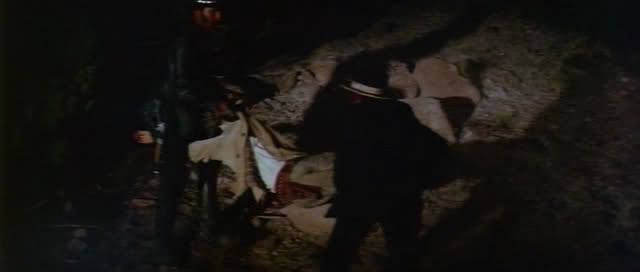
HUNTIN' WHITIES (LIKE A BOSS)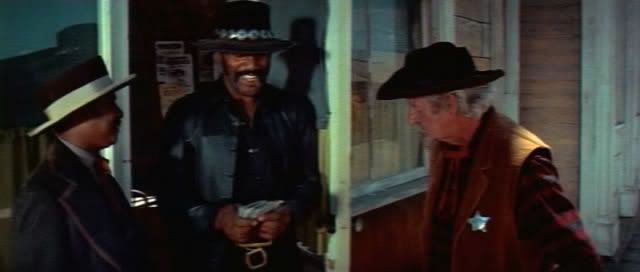
COLLECTIN' BOUNTIES (LIKE A BOSS)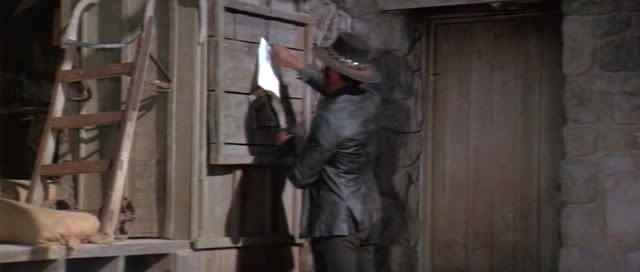
PASSIN' LAWS (LIKE A BOSS)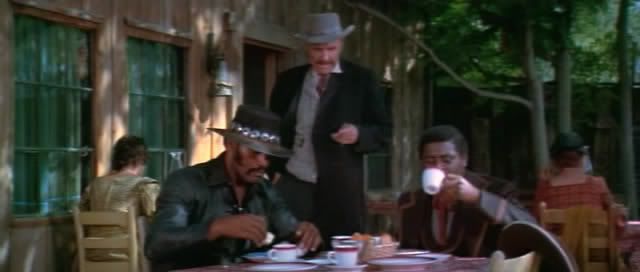
EATIN' BREAKFAST (LIKE A BOSS)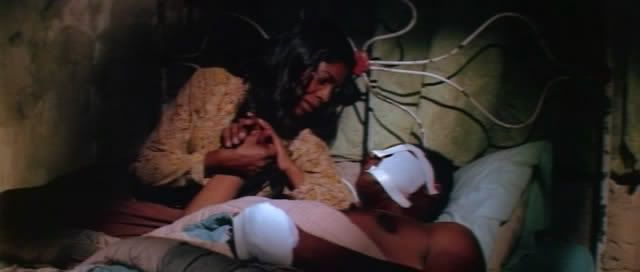
RECOVERIN' IN BED (LIKE A BOSS)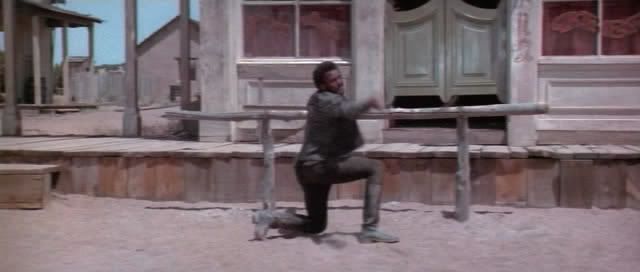
THROWIN' KNIVES (LIKE A BOSS)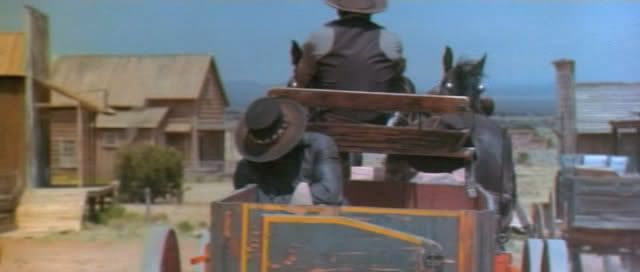
ENDING THE FILM (LIKE A BOSS)
Until next week, folks